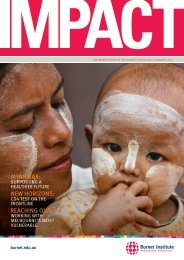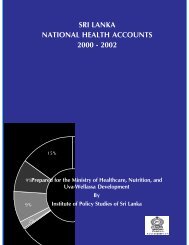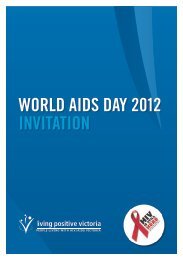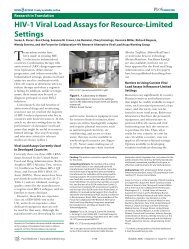Illicit Drug use in the Asia Pacific Region - Burnet Institute
Illicit Drug use in the Asia Pacific Region - Burnet Institute
Illicit Drug use in the Asia Pacific Region - Burnet Institute
Create successful ePaper yourself
Turn your PDF publications into a flip-book with our unique Google optimized e-Paper software.
Situational analysis of illicit drug issues and responses <strong>in</strong> <strong>the</strong> <strong>Asia</strong>–<strong>Pacific</strong> region<br />
242<br />
The capacity of <strong>the</strong> media shall be tapped<br />
and brought to bear <strong>in</strong> all three prongs<br />
of <strong>the</strong> strategy . International cooperation<br />
will be enhanced and taken advantage of<br />
to streng<strong>the</strong>n an anti-drug campaign .<br />
To properly operationalise <strong>the</strong> preced<strong>in</strong>g<br />
strategic three-pronged concepts, <strong>the</strong><br />
Broad Force Implications shall consist of<br />
<strong>the</strong> follow<strong>in</strong>g:<br />
• Holistic Leadership: Local Development<br />
Councils and Anti <strong>Drug</strong> Ab<strong>use</strong> Councils<br />
shall closely coord<strong>in</strong>ate and <strong>in</strong>tegrate<br />
<strong>the</strong>ir programs, projects, and activities .<br />
At a national level, <strong>the</strong> DDB shall closely<br />
coord<strong>in</strong>ate with National Economic<br />
Development Authority (NEDA) and its<br />
foreign counterparts .<br />
• Crim<strong>in</strong>al Justice System: It shall implement<br />
<strong>the</strong> <strong>Drug</strong> Supply and Demand<br />
Reduction Campaign with <strong>the</strong> support<br />
of National Government Agencies<br />
(NGAs), Local Government Units (LGUs),<br />
Non Government Organisations (NGOs),<br />
Government–Owned and Controlled<br />
Corporations (GOCCs), and <strong>the</strong> mobilised<br />
sectors of <strong>the</strong> society .<br />
• NGAs, LGUs, GOCCs, NGOs and Mobilised<br />
Sectors: Shall undertake <strong>the</strong> Development/Reform<br />
Package of programs<br />
which shall be closely orchestrated from<br />
national down to local levels .<br />
• Citizenry: They shall be <strong>the</strong> force/<br />
resource multipliers of <strong>the</strong> Crim<strong>in</strong>al<br />
Justice System and <strong>the</strong> Government<br />
Mach<strong>in</strong>ery mobilised through People<br />
Empowerment and shall participate <strong>in</strong><br />
and support both Supply and Demand<br />
Reduction Campaign, and Development/<br />
Reform Package Programs .<br />
The National Anti <strong>Drug</strong> Program of Action<br />
(NADPA) (Dangerous <strong>Drug</strong>s Board) operationalises<br />
<strong>the</strong> National Anti-<strong>Drug</strong> Strategy<br />
consistent with:<br />
• Comprehensive Dangerous <strong>Drug</strong> <strong>Drug</strong>s<br />
Act 2002<br />
• Anti-Money Launder<strong>in</strong>g Act 2002<br />
• Presidential Decree 1619<br />
• Presidential LOI Nr dated 4 July 2001<br />
• UN Political Declaration, Guid<strong>in</strong>g Pr<strong>in</strong>ciples<br />
of <strong>Drug</strong> Demand Reduction and<br />
Measures to Enhance International Cooperation<br />
to Counter World Problem of<br />
1998<br />
• ASEAN and Ch<strong>in</strong>a Cooperative Operations<br />
<strong>in</strong> Response to Dangerous <strong>Drug</strong>s<br />
(ACCORD) Plan of Action of 2000 .<br />
In order to atta<strong>in</strong> a drug-free Philipp<strong>in</strong>es<br />
<strong>in</strong> 2010, <strong>the</strong> follow<strong>in</strong>g objectives have<br />
been set:<br />
• To dismantle all drug syndicates, f<strong>in</strong>anciers,<br />
producers, traffickers, pushers and<br />
<strong>the</strong>ir protectors/coddlers<br />
• To prevent all non-<strong>use</strong>rs from be<strong>in</strong>g<br />
<strong>in</strong>itiated to drug <strong>use</strong> through education<br />
and <strong>in</strong>formation<br />
• To <strong>in</strong>tervene and convert all drug experimenters/casual<br />
<strong>use</strong>rs to non-<strong>use</strong>rs<br />
• To treat, rehabilitate and empower drug<br />
dependents to become drug-resistant<br />
and productive members of society<br />
• To address <strong>the</strong> risk factors and deficiencies<br />
<strong>in</strong> <strong>the</strong> environment that breed/abet<br />
<strong>the</strong> drug problem <strong>in</strong> society<br />
• To streng<strong>the</strong>n legal research and work<br />
for legal reforms, so as to provide more<br />
legal weapons that can be wielded <strong>in</strong><br />
<strong>the</strong> anti-drug campaign<br />
• To empower all drug affected barangays<br />
as anti-drug self-polic<strong>in</strong>g communities<br />
• To tap and mobilise all NGAs, LGUs,<br />
GOCCs and NGOs for greater community<br />
participation <strong>in</strong> <strong>the</strong> anti-campaign<br />
nationwide<br />
• To motivationally enlighten, organise,<br />
mobilise and br<strong>in</strong>g People Power to<br />
bear aga<strong>in</strong>st <strong>the</strong> drug menance nationwide;<br />
and<br />
• To enhance <strong>in</strong>ternational cooperation<br />
and tap <strong>the</strong> International Community<br />
<strong>in</strong> our anti-drug campaign .<br />
The Comprehensive Dangerous <strong>Drug</strong>s Act<br />
of 2002 (Republic Act 9165) extends to <strong>the</strong><br />
barangay (village) level which is mandated<br />
to establish a Barangay Anti-<strong>Drug</strong> Ab<strong>use</strong><br />
Council (BADAC) whose objective is to<br />
ga<strong>the</strong>r <strong>in</strong>formation and monitor illegal drug<br />
activities . Accord<strong>in</strong>g to NGO key <strong>in</strong>formants,<br />
this is helpful for policy purposes, however<br />
it sometimes breaks down for project implementation<br />
beca<strong>use</strong> it drives <strong>in</strong>ject<strong>in</strong>g drug<br />
<strong>use</strong>r partners underground . NGOs approach<br />
this challenge by educat<strong>in</strong>g and <strong>in</strong>form<strong>in</strong>g<br />
barangay leaders on <strong>the</strong> positive effects of<br />
harm reduction programs .<br />
Law enforcement responses<br />
The details below are found <strong>in</strong> <strong>the</strong> ‘National<br />
Anti-<strong>Drug</strong> Program of Action’ .<br />
Legislation/penalties/prison<br />
The Comprehensive Dangerous <strong>Drug</strong>s Act<br />
of 2002 established <strong>the</strong> Philipp<strong>in</strong>e <strong>Drug</strong><br />
Enforcement Agency (PDEA), responsible<br />
for implementation and enforcement .<br />
The PDEA is <strong>the</strong> lead agency <strong>in</strong> <strong>the</strong> conduct<br />
of supply and demand reduction campaigns,<br />
except prevention, control and f<strong>in</strong>anc<strong>in</strong>g .<br />
PDEA conducts anti-drug f<strong>in</strong>anc<strong>in</strong>g<br />
operations <strong>in</strong> coord<strong>in</strong>ation with <strong>the</strong> Anti-<br />
Money Launder<strong>in</strong>g Council (AMLAC) .<br />
The PDEA also conducts supply reduction<br />
by implement<strong>in</strong>g prevention and control<br />
measures such as:<br />
• Production control: for example, crop<br />
eradication operations, <strong>in</strong>vestigation<br />
and prosecution of owners, planters,<br />
guards<br />
• Process<strong>in</strong>g control: for example, police<br />
search and destroy operations, enforcement<br />
of regulations and monitor<strong>in</strong>g<br />
of <strong>the</strong> movement, process<strong>in</strong>g and<br />
ref<strong>in</strong><strong>in</strong>g of precursor chemicals and<br />
raw materials, <strong>in</strong>vestigation and prosecution<br />
of those <strong>in</strong>volved <strong>in</strong> clandest<strong>in</strong>e<br />
laboratories<br />
• Traffick<strong>in</strong>g control: for example, customs<br />
operations to <strong>in</strong>tercept shipments,<br />
border and coastal patrol operations,<br />
airport security, <strong>in</strong>vestigation and<br />
prosecution of traffickers<br />
243<br />
Country profiles: Philipp<strong>in</strong>es









